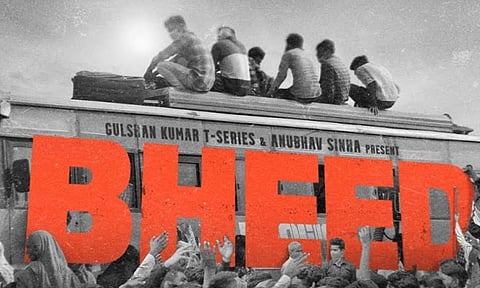Bheed Movie Review: A compelling tale of the migrant crisis, sanitised of any political commentary
Rating:(3 / 5)
“You don’t write about the horrors of war. No. You write about the kid’s burnt socks lying on the road.” Richard Price’s writing tip finally hits home for director Anubhav Sinha in his latest Bheed. He seems to have taken some learnings from Anek (2022) as well. Firstly, Bheed deftly avoids crowding ideas. Secondly, he has toned down the preachiness. Most importantly, he lets the images do the talking. But then, he piles up another image conveying the same message. And another is added because he probably thought the previous one didn’t quite hit the spot. In a Sinha war feature, there would be socks, shoes, a red dress, and finally the blood-smeared toe of a kid.
Starring: Rajkummar Rao, Bhumi Pednekar, Pankaj Kapur, Ashutosh Rana, Dia Mirza, Kritika Kamra, Aditya Shrivastav
Directed by: Anubhav Sinha
Written by: Sonali Jain, Saumya Tiwari and Anubhav Sinha
Still, Bheed paints a poignant picture of a turbulent period. It starts off with a message appearing on the screen, conveying that the film is telling the story of a time when fake news on Covid-19 was spreading faster than the virus itself. This satisfied my burning query as to why characters were not wearing masks in the trailer. Bheed also comes to the point quickly. It doesn’t resort to migrant workers’ plight-porn. There are no low-angle shots of labourers dizzying under the sun or singing songs of resilience in the back of a truck. Once the stage is set, the action jumps to a state border and is contained there. Director Anubhav Sinha’s writing shines when events unfold in restricted environments, like the court in Mulk (2018) or the police station in Article 15 (2019).
Most of Bheed happens around a stretch of road, a vacant shopping mall, and a row of barricades. The plot concerns three types of characters: the affected, the authority and the witnesses. There is a divorced mother (Dia Mirza), who is determined to rescue her daughter from her college hostel before her ex-husband does; a self-serving watchman (Pankaj Kapur) who has taken it upon himself to provide for his family; a father (Omkar Das Manikpuri) who can’t let go of the bottle, despite the incessant chagrins of his daughter; a senior cop (Ashutosh Rana), tasked with arranging a Quarantine centre for the incoming crowd, but he is unable to get a bed for his own ailing parents; an inspector (Aditya Shrivastav) who won’t rest even during a calamity to make a quick buck, and a news reporter (Kritika Kamra) debating the makings of ‘Incredible India’. All of them are concentrated at the state border, waiting to pass through. Each tale, like a wrench, ably tightens the nuts of the narrative. One of them, though, threads through the entirety of the film, and surprisingly, it’s a love story.
Rajkummar Rao plays Surya Kumar Singh Tikus, a cop from a scheduled caste, in love with Bhumi Pednekar’s Renu Sharma, a medical practitioner. Sinha had already proved his grip on caste nuances in Article 15. With Bheed, he touches upon something unexplored in mainstream cinema: the psychological trauma of caste discrimination. In a telling scene, after being unable to perform in bed, Tikus confesses to Sharma that since childhood he has been told what to touch and what not to, so when he touches her, his hand trembles. It is a scene that stands on its ground but then Sinha’s commercial director genes kick in and we get an unnecessary sequence of the couple making love. Except for cheap titillation, it adds nothing.
Rao plays Tikus with charming humility. His cop is torn between following orders and looking out for his people. Another star act is Pankaj Kapur’s Trivedi. The veteran actor embodies the role of a mercurial watchman with humorous volatility. Trivedi is a character who can be parachuted inside a western and won’t even feel the difference. Ashutosh Rana and Aditya Shrivastav bring necessary humour to a serious narrative. When Kapur’s Trivedi picks up the gun, Rana’s senior cop tells Shrivastav, “I think we can shoot him now, since he has become a Naxalite.” It’s an absolute hoot.
Bheed touches upon a lot but leaves out even more. It sticks to being a social commentary and distances itself from political overtones. There is mention of Corona Jihad but no murmur of arrests of members of the Tablighi Jamaat. After the screen fades to black, white texts keep on appearing, in quick succession, informing us of the happenings that weren’t covered. Stories of migrants dying after a lorry toppled or them being run-over on the railway track. It misses out on a crucial one: “No data available on migrants’ deaths during lockdown, says government in Parliament.”


